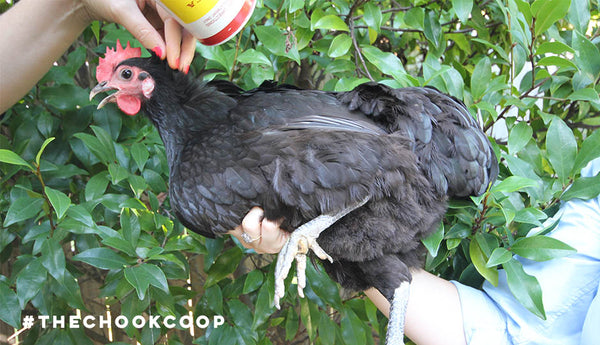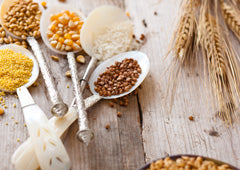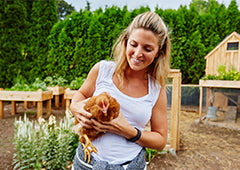Everybody has heard of the term Salmonella, but not many people know what it actually means. Many people steer clear of certain uncooked foods such as runny eggs (and won’t dare to lick a spoon with uncooked cake batter on it!) because they believe these raw foods are a one way ticket to a churning stomach. Well, we want you to have your cake batter and eat it (sparingly) too - so here’s some facts and myths about Salmonella - how you get it, what you get it from and how likely it really is that you’ll come into contact with this disease.
The good news is there are many ways you can easily prevent becoming sick from Salmonella, and it’s certainly no reason to hold you from getting your own backyard flock. In fact, the fresh eggs you get from your own backyard chickens have a lesser chance of containing Salmonella than those you buy from the shop - just another reason why we love our free-ranging chickens!What is Salmonella?
Salmonella itself is a bacteria that can cause diseases in humans - it’s not the actual disease. Ingesting the Salmonella bacteria is what makes humans sick.
The disease people catch as a result of consuming Salmonella is referred to as Salmonellosis. The symptoms of this are similar to what people usually refer to as ‘gastro’ (Salmonellosis is a type of gastroenteritis disease) and can include nausea, vomiting, fevers and other unpleasant health problems.
The effects of Salmonella usually start between 6-72 hours after the bacteria has been ingested.Before you put your tin foil hats on....
We’re going to stop you right here before you keep reading about Salmonella, and use this as an opportunity to say the chances of finding Salmonella, or becoming sick from it are actually very slim. Many egg enthusiasts go their whole lives licking cake batter and enjoying oozing yolks on toast without coming into contact with the bacteria.
Alright - now lets educate ourselves about the disease, remembering not get scared or paranoid - eggs are delicious, nutritious and great for you!
How does Salmonella bacteria make its way into our food?
Domestic farm animals like chickens, cows and pigs can often carry the Salmonella bacteria in their intestines. The animal doesn’t show any signs of illness, but their meat and other animal products that we consume can contain the bacteria.
Why is Salmonella more commonly associated with chickens?
The bacteria is more commonly associated with poultry because not only do we consume their meat, we consume lots and lots of their eggs - a product that can be affected by Salmonella bacteria. The main other animal product consumed from animals is dairy, but the risk is low because of the pasteurizing process those commercial products go through.
How do animals get the Salmonella bacteria in the first place?
Salmonella bacteria is transferred to animals by coming into contact with other wild animals such as rodents, wild birds, flies and other vermin. From here the bacteria lives inside the animal's intestines. Lovely stuff isn’t it!
What are the most common causes of Salmonella bacteria?
There are a number of common ways Salmonella bacteria can come into contact with people, and also foods that can make people sick from Salmonellosis due to contamination.
- Raw meat
Eating undercooked meat is one of the ways Salmonella bacteria can be consumed. People who like eating their meat rare, medium rare or medium can contract Salmonellosis by eating the bacteria.
- Raw animal products - eggs, unpasteurized milk or other unpasteurized dairy
Undercooked eggs are another food item that can contain Salmonella bacteria (more about how the bacteria gets in their later). The bacteria is transmitted through people eating soft boiled and soft poached eggs with a runny yolk.
The same goes for ‘raw’ milk that hasn’t been pasteurized - it may contain Salmonella bacteria from the animal.
- Other produce being contaminated
If raw meat comes into contact with other things such as fresh produce or already cooked foods, then the bacteria can be transferred. Common ways this happens is using a chopping board or knife to cut raw meat, and then using it to prepare other foods without washing it first.
-
Transferred by people
It is possible for people who have already been affected by the Salmonellosis virus to transfer it to other people, if they haven’t washed their hands properly or taken other hygiene precautions
- Not taking proper hygiene precautions after being in contact with farm animals
Some farm animals including chickens can carry Salmonella bacteria, along with their feeders, drinkers and hutch. When people don’t wash their hands properly after coming into contact with these items, they can make themselves sick by transferring the bacteria to the food they eat.
What’s the risk of getting Salmonella from my eggs?
Honestly, the risk of getting Salmonella is very slim for us ordinary egg eating folk. Commercially produced eggs in Australia are put through a cleaning process before they hit the shelves, and producers generally don’t let other wild animals and Salmonella infected chickens into contact with the egg layers. As long as you refrigerate your eggs when you collect them from the nesting boxes/bring them home from the shops, the bacteria (if it’s there in the first place) can’t grow to a harmful level.
Don’t be alarmed! There are many ways you can take precautions to prevent the bacteria, and the disease.
There are a number of precautions you can take to keep the risk of Salmonella at bay. These include:
- Cook your meat all the way through - whether its bought, or from your own animals.
Raw meat can house Salmonella bacteria, so if you want to take extra precautions, cook your food all the way through.
- Keep your animal’s housing clean, and free from rodents, wild birds and other pests.
Keeping vermin away from your animals will reduce the risk of the Salmonella bacteria being transferred into their meat and produce. Always clean up spilled feed and put it away at night (as this can attract rodents), give their environment a spring clean regularly and keep wild birds such as turkey’s away (a predator sensor light may come in handy for this).
- Remember to wash your hands!
If you’ve been touching and handling your animals, or have come into contact with their house/feeders/waterers, thoroughly wash your hands. This will help ensure you don’t accidentally transfer the germs to anything else. If you’ve got children, make sure they wash their hands as well.
- Keep your eggs in the fridge if you’re not using them straight away
Storing your eggs in cool temperatures means that bacteria won’t have a conducive environment to multiply. If you’re planning on storing your eggs for a week or two, then keep them in the fridge. You can always take them out the day before if you need them to be room temperature. Popping them in an egg skelter is also a great idea!
Salmonella isn’t pleasant, but nor is it common. Taking a few simple precautions will keep you and your family enjoying fresh meat and produce for years to come!
When preventing illnesses and keeping your chooks safe, make sure that you've got the knowledge you need to raise a happy, healthy flock. Did you know 67% of chicken keepers surveyed experienced a chicken health or behaviour issue in the first 12 months that they didn’t know how to handle?
But don’t worry! Our feathered friends over at Chickenpedia have created a Chicken Healthcare Course. It is a comprehensive online course that covers everything you need, including what to look for in an unhealthy chicken and how to support your egg-laying hens to optimal health. All of their courses are really well structured, which is why I highly recommend them to all of my readers! From raising baby chicks to feeding to behavior, you’ll find valuable information that’ll give you the knowledge and confidence to successfully look after your chickens.
Check out Chickenpedia today. As a member, you will also get access to the ALL of their chicken courses!

















